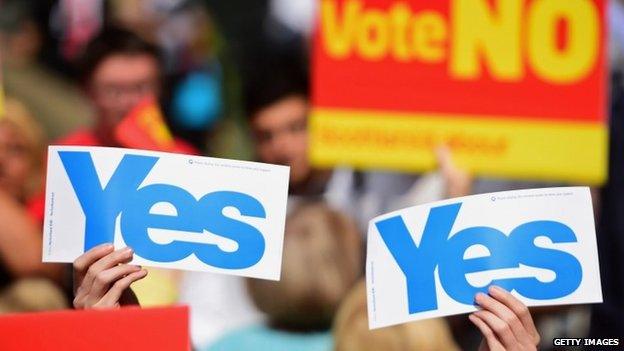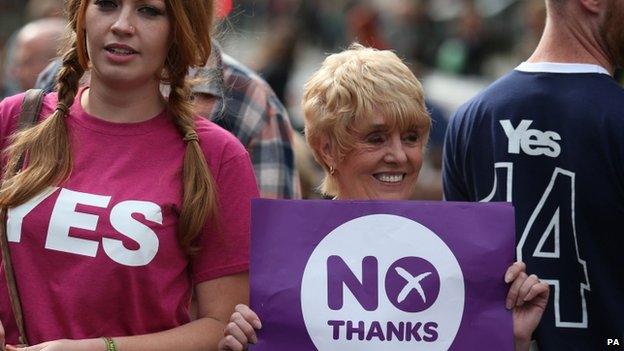Scottish independence: Salmond says Scotland is 'on cusp of making history'
- Published
First Minister Alex Salmond is marking the anniversary of the 1997 devolution referendum
Scotland is on the "cusp of making history" by voting for independence, the country's first minister has said.
Alex Salmond described the referendum as a "process of national empowerment".
He also called for an inquiry into what he said was the leaking of sensitive market data by the Treasury involving RBS plans to move its headquarters to London if voters choose independence.
Five banks have said they might move operations out of Scotland, while John Lewis and Asda warned prices may rise.
RBS confirmed it would relocate its registered headquarters in the event of a "Yes" vote, insisting that the move would not impact jobs or operations.
Mr Salmond accused the UK government of deliberately leaking the news about RBS to the BBC and other news outlets before the bank made the announcement officially.

The latest You Gov poll suggests the No campaign has gained a narrow lead
He said it was an attempt of scaremongering aimed at damaging the independence campaign and called for an investigation into civil servants leaking market sensitive information.
However, former prime minister Gordon Brown was among pro-unionists who questioned Mr Salmond's insistence that the warnings were just scaremongering.
"You can dismiss some of the warnings some of the time, but you can't dismiss all of the warnings all of the time," Mr Brown said.
The SNP leader, Mr Salmond, was speaking to the international media at an event in Edinburgh, which was taking place on the anniversary of the 1997 devolution referendum.
"They have now been caught red-handed of being part of a campaign of scaremongering," Mr Salmond said.
"I'm not making that position against any of the companies concerned but quite clearly if you brief market sensitive information last night to one broadcaster which is meant to be released at 07:00 BST this morning, it puts the Treasury fingerprints all over this story and it provides a spectacular example of the sort of campaign tactics of intimidation and bullying that have served the no campaign so badly."
Sir Jeremy Heywood, head of the civil service, rejected the suggestion. In a letter to the first minister, he said staff had merely "confirmed its understanding of RBS's contingency planning" judging this was important to "maintain financial stability".
He added that he had consulted Prime Minister David Cameron on the issue, who was clear that there had been no breach of the Ministerial Code.
In other referendum news....
The Electoral Commission has revealed that 4,285,323 people have registered to vote in the referendum.
The Edinburgh-based Scotsman newspaper says it is backing a "No" vote. In a leader piece, the publication said it was concerned about issues such as currency, EU membership and defence.
Scotland's largest fund manager's boss said an independent Scotland would be a huge success. Martin Gilbert, chief executive of Aberdeen Asset Management said: "I think an independent Scotland would be a big success, but it is a secret ballot and I will abide by that."

Prices in Scottish branches of John Lewis and Waitrose may be higher than the rest of the UK if the country votes "Yes". The chairman of the John Lewis Partnership told the BBC that it was "most probable" that prices will rise, as the costs are passed on to customers.
The Institute for Fiscal Studies said an independent Scotland would find it harder to protect the NHS, while Health Secretary Alex Neil said the real threat is from budget cuts imposed by the UK government.
The latest opinion poll, by You Gov for The Sun and The Times, has suggested a "No" campaign lead by 52% to 48%. Two previous polls suggested the race was neck and neck.
Seventeen years ago, Scotland voted overwhelmingly for devolution, leading to the re-establishment of the Scottish Parliament after nearly 300 years.
SNP leader Mr Salmond used the anniversary on Thursday to argue that a "Yes" vote for independence in the referendum next week would be a continuation of "Scotland's constitutional journey to date" and would mark "the opportunity of a lifetime".
"Scotland is on the cusp of making history. The eyes of the world are upon Scotland. And what the world is seeing is an articulate, peaceful, energised debate," he said.
"Scotland will vote 'Yes' next Thursday and they will vote 'Yes' because last-minute, cobbled up promises from the 'No' campaign which unravel at the slightest scrutiny will not fool anyone in this country and neither will the blatant bullying and intimidation of the Westminster government."


The social media debate over Scotland's future has been particularly passionate at times. A week before voters in Scotland head to the polls BBC Scotland's Andrew Kerr answered your questions on the BBC News Facebook page, external about the campaign, the referendum and what's at stake for Scotland.
Keep following the debate on social media by using #indyref #ScotlandDecides

"The 'No' campaign is in terminal decline. In contrast a 'Yes' vote is the opportunity of a lifetime. An opportunity to build a fairer, more prosperous country."
The comments came after David Cameron, Ed Miliband and Nick Clegg made separate calls, external for Scots to vote "No" in the 18 September referendum.
The three leaders have backed a plan of action spearheaded by former Prime Minister Gordon Brown, which they have said would see work begin on the handover of new powers on 19 September, the day after the referendum.
Labour leader Mr Miliband has been campaigning in Glasgow city centre alongside Scottish Labour leader Johann Lamont, Labour peer and scientist Robert Winston and Labour MPs from across the UK.
Speaking by the statue of Donald Dewar, who became the first Labour First Minister of Scotland following devolution, the UK Labour leader said: "It is now clear what the choice is in this referendum.
"Change with 'No' or huge risks with 'Yes'. With 'No', more powers for a stronger Scotland. With 'Yes', risks to jobs, the economy and the NHS."